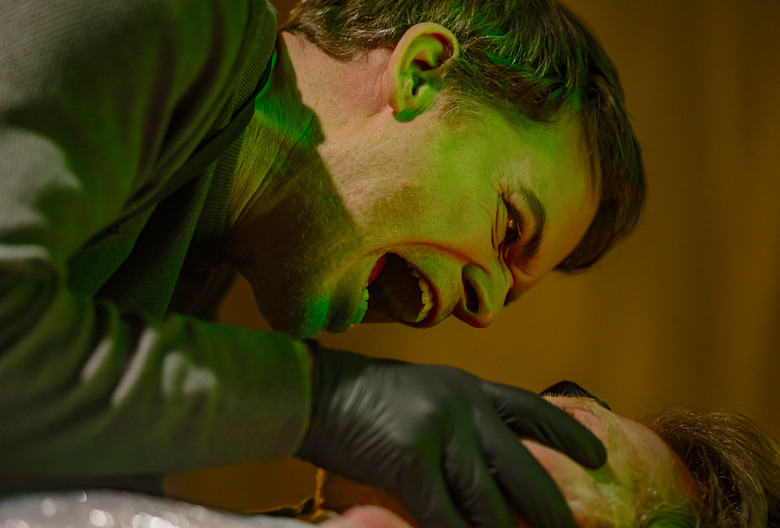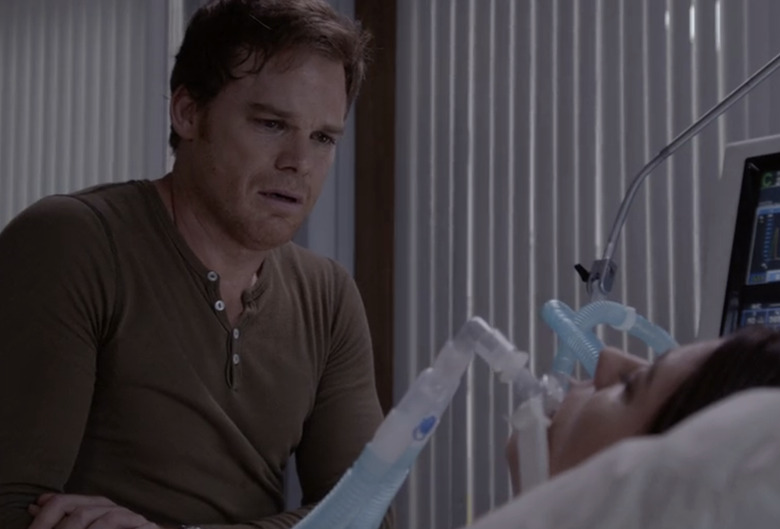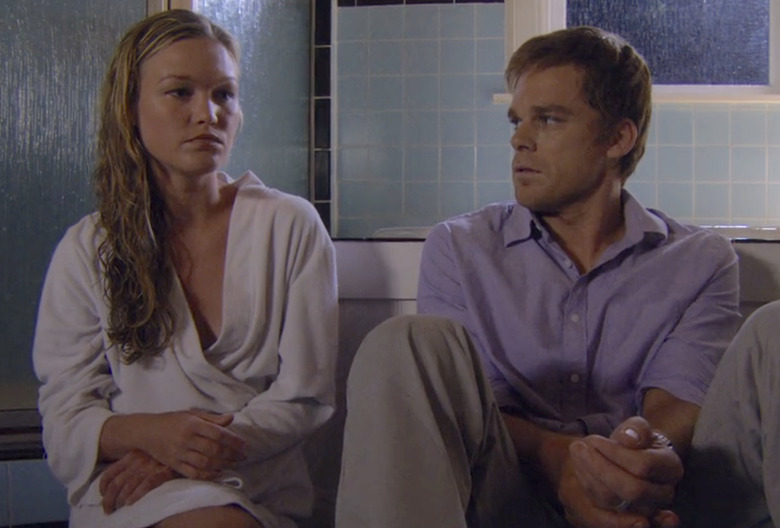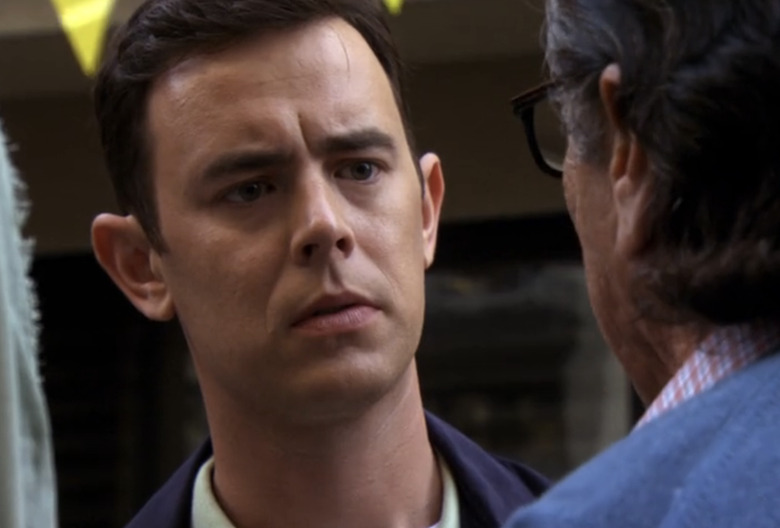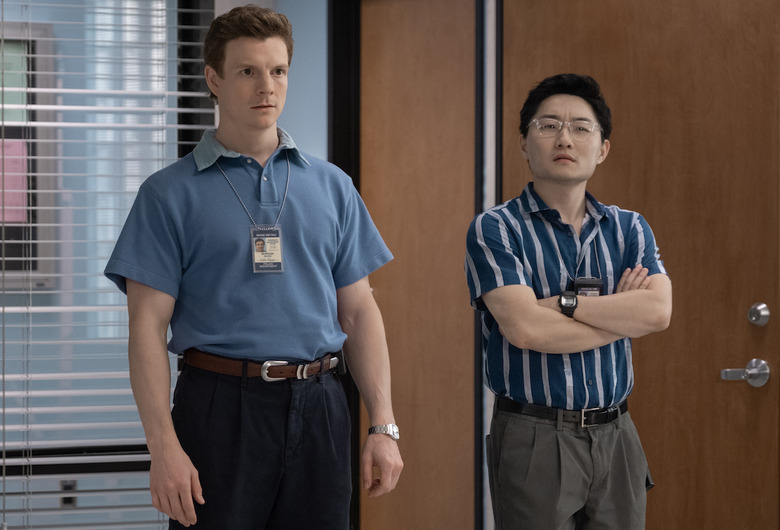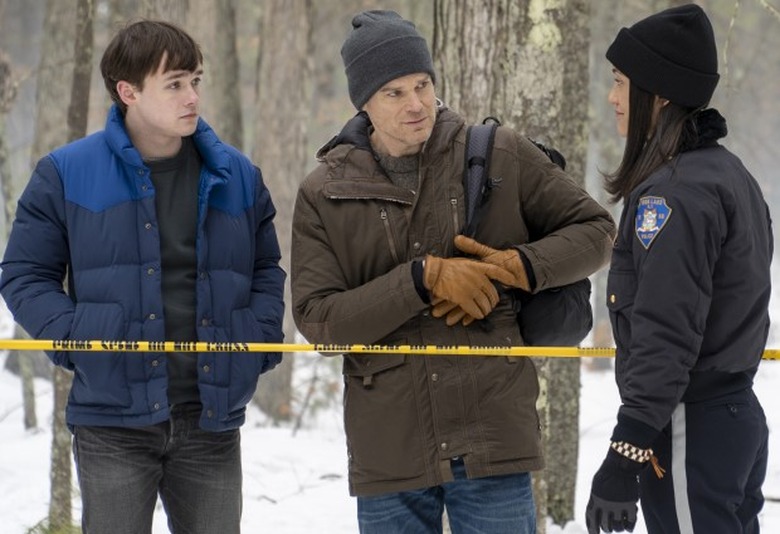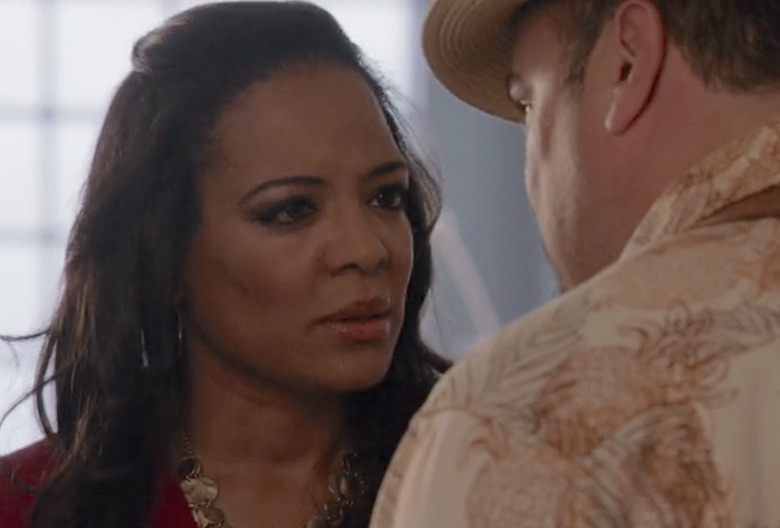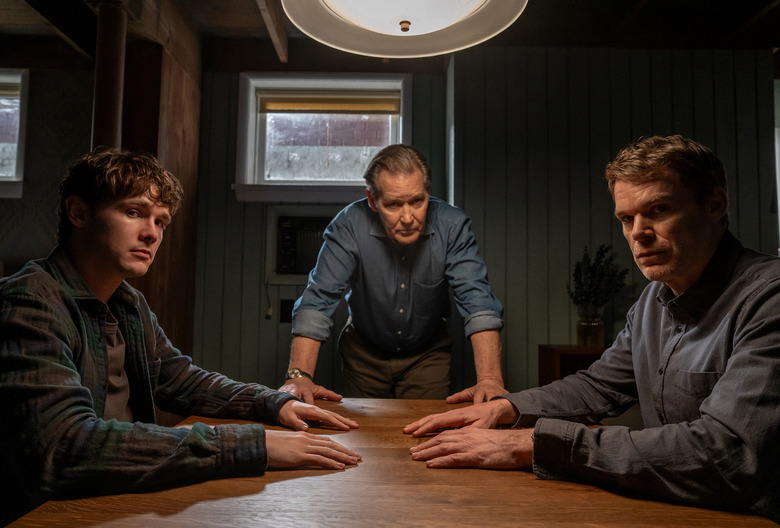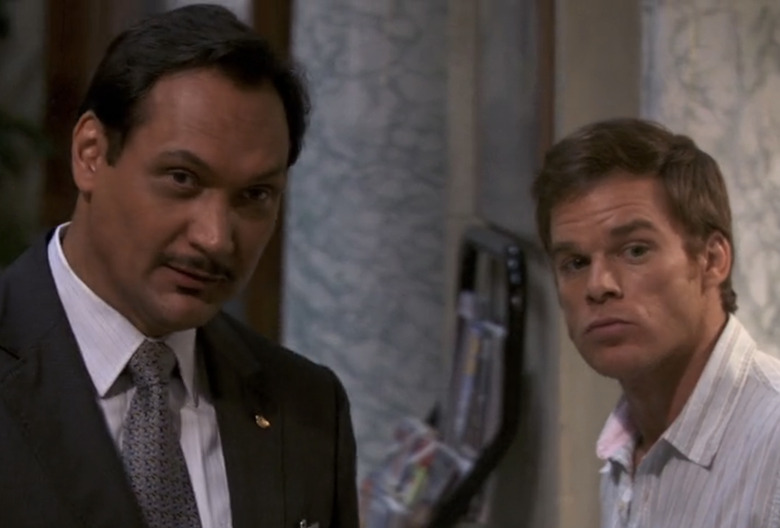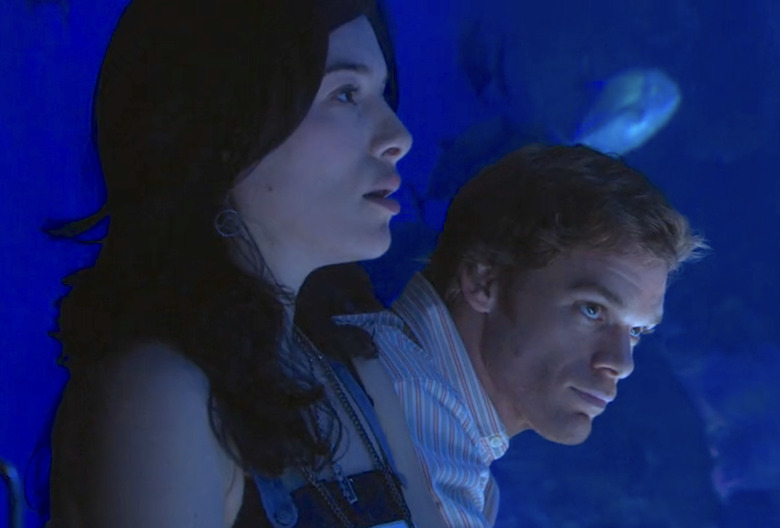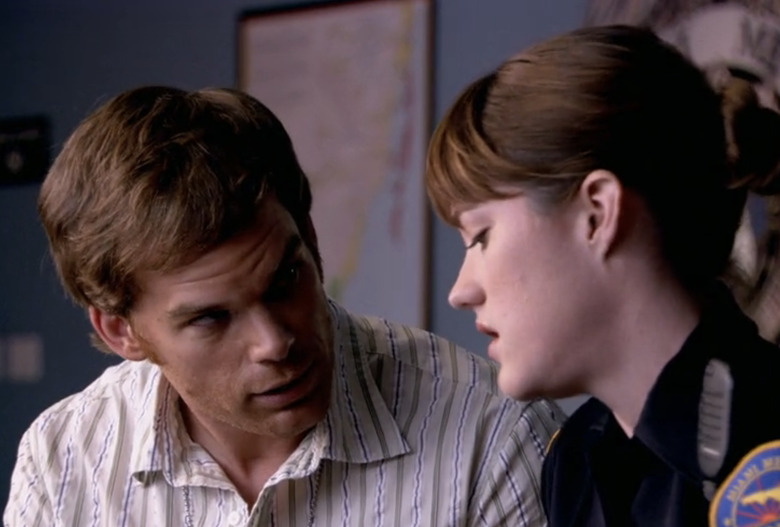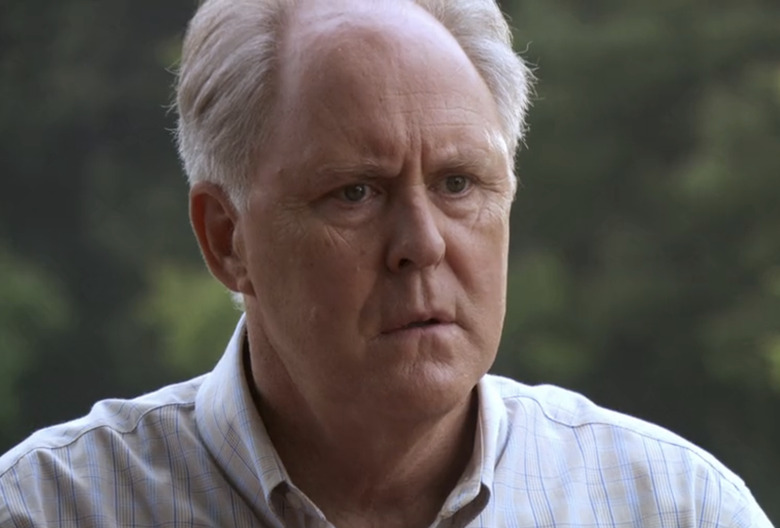Dexter: All 11 Seasons Ranked From Worst To Best — Where Did Resurrection Land?
When Dexter premiered on Showtime in October of 2006, the character swiftly staked his claim as one of TV's greatest antiheroes of all time. Who knew that watching a murderous villain hiding in plain sight as a blood spatter analyst could be so thrilling?! And... fun?
Led by the sturdy Michael C. Hall and adapted from the novels by Jeff Lindsay, Dexter follows Dexter Morgan, a Miami Metro PD blood expert who spends his free time satisfying the urges of his "dark passenger." While operating in the shadows as a serial killer, Dexter obeys his own moral code, a set of rules instilled in him by his late father and former detective Harry Morgan. The catch: Dexter only targets other killers. Evil people who prey on the city's innocents. A serial killer who only takes out other serial killers? Now, that's a premise!
With Dexter: Resurrection having completed its run, we're diving deep into the franchise's history to separate the crime drama's best, most excellent seasons from, well, Season 8. From flashy guest stars to the series' most cutthroat villains, we're taking stock of the good, bad and the ugly to rank each installment of Dexter from worst to best.
Scroll down to see where your favorite seasons placed in our ranking, then hit the comments to give us your thoughts on all things Dexter!
11. Season 8
Convoluted, sloppy and confusing. It's no shocker that we (and mostly everyone who watched at the time) ding Season 8 for its very unsatisfying finale. (Check out our list of the Worst TV Series Finales of All Time to see where Dexter placed.) But aside from that whole "Dexter became a lumberjack" thing, the season saw Debra spiraling out as an effect from her murdering Maria LaGuerta the season prior. What could've been a great subplot was squandered by weak writing and the character's rushed recovery, which felt all sorts of erratic. And the addition of Dr. Evelyn Vogel, who turned out to be the creator of Dexter's code, undercut the series' lore. Not only did it disempower Harry's ghostly role in Dexter's life, but it was a cheap attempt at retconning Dexter's origins, which felt both unnecessary and stale.
10. Season 5
Any storyline and subsequent guest star that followed John Lithgow's Trinity Killer was surely going to be a step down, but Season 5 was a fall from grace. Dexter partnering up with another like him was an interesting prospect, but the season didn't have the same bite as its predecessors. (Maybe, in part, because Lumen, a victim Dexter saves from a group of rapists, wasn't like him after all.) Speaking of, the Barrel Girl Gang was forgettable as the season's main antagonists, and although we empathized with Lumen's plight, Julia Stiles' performance felt stiff, leaving a lot to be desired from a show that had helped usher in the Peak TV era.
9. Season 6
Apocalypse-style killings, lots of religion, Colin Hanks. Few things about Dexter's sixth season were truly memorable. Hanks was fine as Travis Marshall, the man ultimately revealed to be the Doomsday Killer, but in the grand scheme of the franchise's guest-stars, it was a forgettable turn. The reveal that his mentor, Professor James Gellar (played by Edward James Olmos), was dead the whole time and merely Travis' own Harry was a nice twist, but the season's slower pace didn't quite hold our attention... until those last few moments when Debra walks in on Dexter killing Travis, of course. Brownie points for setting up the much better season that followed — and we all know how much Dexter loves brownies!
8. Dexter: Original Sin
Prequels can be a mixed bag. While Original Sin didn't quite match the highs of the original series or its follow-up New Blood, there was enough to enjoy here. Patrick Gibson was a very convincing killer-in-training, nailing Dex's social awkwardness and high intelligence. In the competent hands of original showrunner Clyde Phillips, we were impressed by many of the younger versions of the characters we had come to love. (Kudos to the casting department.) Molly Brown was as sassy as ever as a young Debra, while Christian Slater was a solid choice to step into Harry's shoes. Add Sarah Michelle Gellar and Patrick Dempsey to the fold for some extra star power, and some major backstory for our favorite killer's brother-turned-Ice Truck Killer and you have a very solid, middle-of-the-road installment of Dexter. Was it absolutely necessary? Not really. But we're intrigued to see where this one goes next.
7. Dexter: New Blood
Color us surprised when Hall and Phillips announced their return to the franchise, giving the two creatives another stab at rewriting Dexter's ending. And at the time, boy, did they stick the landing. Watching Jim Lindsay Dexter kickstart a new life in a snowy upstate New York town was a breath of brisk, fresh air compared to his former life in sunny Miami he was forced to abandon. The addition of a grown-up Harrison gave Dexter a new wrinkle to contend with, and the season's main antagonist, Clancy Brown's Kurt Caldwell, created loads of dark moments and squirmy moments. Plus, that ending! Dexter killed at the hand of his own son?! Incredible, even if Resurrection rewrote it. Based on how great that follow-up series has been so far, we're not even mad! (Read our New Blood finale post mortem with Phillips here.)
6. Season 7
Debra finding out who Dexter really was turned the entire series on its head. As LaGuerta kept spinning her theory about the Bay Harbor Butcher (and closing in on her colleague Dexter), Dexter's sister was forced to lie and betray her responsibilities as a detective, all of which kept weighing heavily on her, adding heaps of tension and entertainment value. The addition of Hannah McKay (played by future Handmaid's Tale vet Yvonne Strahovski) gave our guy another morally gray character to play with, which further complicated his relationship with his dear sister — until that shocking ending that saw Debra shoot and kill LaGuerta in order to protect her brother. As far as the back half of the original series goes, this one had it all: great acting, tight writing and one helluva cliffhanger.
5. Dexter: Resurrection
We were admittedly a bit hesitant when news of Dexter's resurrection first broke, but we're pleased to report that this second revival series was overall a major success. From its dynamite casting (Peter Dinklage! Uma Thurman!) to its "buffet of killers" that had Dex mingling with others in his, uhh, line of work, Resurrection took the show's entire concept and tripled down on its mayhem and bloodshed. Billionaire Leon Prater was a formidable villain as a disciple of murderers, adding an intriguing and very sinister layer to the franchise's lore. From the bombshell that was the Gemini Killer twist to Angel Batista's hot pursuit of the real Bay Harbor Butcher, Resurrection served up heaps of nostalgia that was delicately balanced with fresh story and edge-of-your-seat tension. By season's end, we were more than glad that Dexter survived that rifle blast to the chest. Consider us fully seated and ready for more.
4. Season 3
Over the course of its run and even through its current Resurrection era, Dexter has showcased a smorgasbord of enticing guest stars who have all helped raise the show's emotional stakes. Enter NYPD Blue vet Jimmy Smits, who starred in Season 3 as Assistant District Attorney Miguel Prado. Prado's brother Oscar was killed by Dexter in self defense, but the loss of his brother turned Miguel into a justice-seeking vigilante. Dexter and Miguel bonded over their shared dark pasts and urges, and soon started working together, but once it was revealed that Miguel is a tortured killer whose thirst for justice has spiraled out of control, the moral gray area collided with Dexter's code, putting Miguel squarely into Dexter's crosshairs. It was a sidekick story that went sideways, but the storyline differentiated this third outing from the others that came before it. Season 3 gave us another avenue inside Dexter's psyche, adding yet another wrinkle to the show's complicated antics and bloody action. Who knew friendships between serial killers could be so complex?
3. Season 2
The addition of Lila West spun the series and its antihero into directions we never could've predicted. Sure, Harry's code kept Dexter in line for the greater part of his adulthood, but Lila symbolized chaos. Freedom. Indulgence. What would happen if Dexter... ignored his code? The woman was wild, and ultimately, dangerous. She killed Doakes! And was a bats–t arsonist! The character not only kept Dexter on his toes, but us as well, and when Doakes finally figured out who Dexter was and what he was up to, the show's second season became an absolute thrill ride, right down to its last few moments. No sophomore slump here.
2. Season 1
When Dexter's first season hit, it immediately secured Dexter Morgan a place among some of TV's best antiheroes like Tony Soprano, Walter White, Vic Mackey and more. While drenched in dark humor, the first run was deeply subversive, making us root for the killer thanks to his unique code. Hall brought every ounce of his charisma to the role, solidifying our connection and love for his titular blood spatter analyst, as he unraveled a fraught mystery surrounding a fractured family's past and a Big Bad who'd become known as the Ice Truck Killer — and we never could've guessed those two plot elements would be connected. Season 1 was richly written against a colorful Miami tapestry, with an ensemble of characters we immediately connected with. We always knew that freshman season would be a high bar to top, until...
1. Season 4
The season of the Trinity Killer and John Lithgow. Dexter's cat-and-mouse game with Arthur Mitchell led to some gripping television, as Dexter tried to understand how a murderer could could also lead a life as a respected father and church deacon. The entire relationship between Dexter and Arthur symbolized hope for our titular killer, but of course, Mitchell was a monster without a code. Thus, Dexter knew he had to deal with his new nemesis before the cops circled in. The season consistently delivered Emmy-worthy scenes between Hall and Lithgow (the latter won a trophy for Guest Actor in a Drama Series), and an ending for the ages. Dexter took down the Trinity Killer, but not before Arthur killed Rita and left her bloody body in the bathtub. And poor baby Harrison was found screaming on the floor in a pool of his mother's blood. (Sound familiar?) A truly unforgettable end to an electric season of Dexter.
